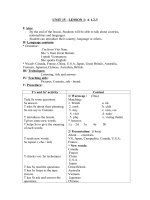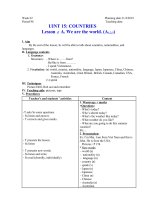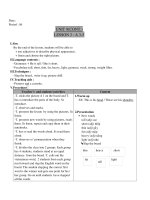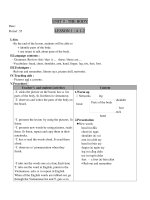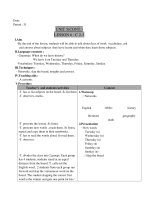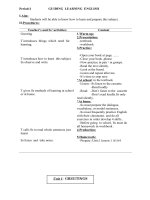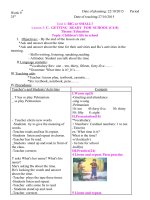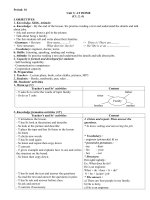- Trang chủ >>
- Văn Mẫu >>
- Văn Kể Chuyện
tieng anh 6 sach cu
Bạn đang xem bản rút gọn của tài liệu. Xem và tải ngay bản đầy đủ của tài liệu tại đây (131.86 KB, 12 trang )
Planning date: 10/10/2016
Teaching date: 12 + 13 +14/10/2016
Total of students: 6A……………….
6B:………………..
PERIOD 25 +26
UNIT 5: THINGS I DO
Lesson 1: My day (A.1- 4)
I. Aims:
1. Knowledge :
- To introduce the students new words and structures relating to the topic “Things I do”
- By the end of the period, students can describe everyday routines.
1. Vocabulary
Everyday, play games, do the homework, watch television, do the housework,
listen to music, read, after school
2 . Grammar
- What does he/she do every morning?
- He gets up.
2. Skills: -Listening, Speaking, Reading & Writing skill.
3. Attitude: Ss love things they do every day
4. Formation and capacity development
II. Teaching aids:
Textbook ; a posters; CD- cassette.
III. Procedure:
1. Organization: Greeting and checking attendance
2. Revision: a. Questions : _Asks two students to go to the board, ask and answer the
time: + 7:00; + 6:55; +5:45
b. Keys To The Questions:
+ What time is it?
+ It’s seven o’clock.
+ It’s six fifty five.
+ It’s five forty five.
3. New lesson:
Teacher and students’
Contents
Formation and
activities
capacity
development
3.1.Warm up
What time do you get up?
T: ask questions
What time do you have
- Formation and
Ss: answer the questions
breakfast?
development of
What time do you do to school? communicative
A1
competence of
3.2. Presentation
students.(5)
Ss: - listen to the tape twice
New words
and then repeat the sentences.
- everyday (adv) : hang ngày
Ss: - look at the picture and
- do (v) :
làm
answer what Nga is doing ( in
- homework (n) : bài tập về nhà - Formation and
Vietnamese)
- play games (v) : chơi trò chơi. development of
T: help them understand new
words and write them on the
board.
Ss: repeat the new words after
the teacher. (choral and
individuals)
* Checking VOC by rub out
and remember.
Ss: listen to the tape and repeat
once more.
Ss: - work in pair. Ask and
answer the questions in part A.2
- some pairs ask and answer
in front of the class.
3.3. Practice
Ss: listen to the tape part A.3
and repeat.
Ss: work in pair. Practice the
dialogue.
selfmanagement
capabilities and
personal
development of
students.(3)
A2
a. Nga gets up at six.
b. She goes to school.
c. She plays games.
d. She does the homework.
A.3
- after school (adv) : sau giờ
học
- watch TV (v) : xem Tivi
- housework (n) : bài tập về nhà
- listen to music : nghe nhạc
- read (v) : đọc
Ss: - work in pair. Ask and
answer the questions in part A.4 A4
a. She does the housework.
- feedback: S <-> S
b. He watches TV.
c. She reads.
d. He listens to music.
3.4. Production:
* Questions
T: ask some more questions
- What do you do in the
Ss: answer the questions
morning?
- What do you do after school?
- What do you do in the
afternoon?
4. Consolidation:
- Two students read the sentences again.
5. Homework:
- Learn new words by heart. Read A1-3 again.
- Prepare Unit 5 (A.5,6,7): find out the new words.
- Look at the pictures in p.54, 55 then answer the question:
? What do they do?
? What does he/ she do?
Planning date: 15/10/2016
Teaching date: 17 + 19/10/2016
- Formation and
development of
organizational
capacity,
executive search
and use of
students
information
point.(6)
-Forming and
developing the
capacity to
detect and solve
the problem of
students.(7)
Total of students: 6A………….…….
6B:……………….
PERIOD 27:
UNIT 5: THINGS I DO
Lesson 2: My day(A. 5- 7)
I. Aims:
1. Knowledge :
- To introduce the students more new words and structures relating to the topic “My
Day”
- Students can talk about daily activities.
1. Vocabulary
Volleyball , soccer , girl , sport
2 . Grammar
Yes-no questions with: Do/Does
2. Skills:
-Listening, Speaking, Reading & Writing skill.
3. Attitude: Loving the things they do every day
4. Formation and capacity development
II. Teaching aids:
Textbook ; a posters; CD- cassette.
III. Procedure:
1. Organization: Greeting and checking attendance
2. Revision:
a. Questions :
_Asks two students to go to the board, ask and answer the following questions:
+What does Nam do after school?
+What does Thu do after school?
b. Keys To The Questions:
+ He listens to music after school.
+She reads after school
3. New lesson:
Teacher and students’
Contents
Formation and
activities
capacity
development
3.1.Warm up
Formation and
Ss: listen to the tape part
- listening and write.
development of
A.3(unit 5) and write what
A5
self- learning
they hear.
New words
abilities,
3.2. Presentation
- volleyball (n) :
learning style of
Ss: - listen to the tape twice
- soccer (n) :
students.(2)
and then repeat the dialogue.
- sport (n) :
T: help them understand new - girl (n) :
words and write them on the
board.
Ss: repeat the new words after
the teacher. (choral and
- Formation and
individuals)
development
* Checking VOC by slap the
board.
Ss: listen to the tape and
repeat once more.
Ss: - work in pair. Play the
roles of Ba and Lan.
- some pairs play the roles
in front of the class.
3.3. Practice
T: help students understand
the yes-no questions with
Do/Does.
Ss: listen to the tape the
questions in part A.6 (sentence
by sentence) and answer with
Yes or No
* There are about 4 or 5
students answering each
question
Ss: - work in pair. Ask and
answer the questions in part A.6
- feedback: some pairs
practice in front of the class.
3.4. Production:
T: ask some more questions
Ss: answer the questions
cooperation
capacity of
students.(4)
A6
- Do you play soccer?
Yes, I do/ No, I don’t
- Does she play soccer?
Yes, she does/ No, she doesn’t.
Listening
Questions: a -> g
- Formation and
development of
communicative
competence of
students.(5)
Answer with Yes, I do/ No, I
don’t
- Do you watch television?
- Do you listen to music?
- Do you play soccer?
A7
- Formation and
I play….; You play……
development of
He/ She plays…….
organizational
We play…..; They play……
capacity,
I watch……; You watch…..
executive search
He/she watches……
and use of
- Listen and repeat A.7 after the We watch…..; They watch….. students
I do……; You do….
information
teacher.
He/she does.....;
point.(6)
Ss read and write in your
We do ……..; They do………..
exercise book
4. Consolidation:
- Two students read the dialogue again.
5. Homework:
- Learn new words by heart and practice the dialogue with friends.
- Prepare Unit 5 (B1): Read and find out the new words and answer the questions:
- ? What does he do in each picture.
Planning date: 17/10/2016
Teaching date: 19 + 21/10/2016
Total of students: 6A………….…….
6B:……………….
PERIOD 28:
UNIT 5: THINGS I DO
Lesson 2: My routine ( B1, 2, 3 )
I. Aims:
1. Knowledge :
- To introduce the students new words and structures relating to the topic “My
Routine”
- By the end of the period, students can describe everyday routines.
1. Vocabulary
Take a shower , eat , from …..to…… , have lunch , go home , go to bed start ,
finish
2 . Grammar
- What time does he/she……….?
- He/ She gets up/………. at six
2. Skills:
-Listening, Speaking, Reading & Writing skill.
3. Attitude: Loving their routine
4. Formation and capacity development
II. Teaching aids:
Textbook ; a posters; CD- cassette.
III. Procedure:
1. Organization: Greeting and checking attendance
2. Revision:
a. Questions :
_Asks two students to go to the board, ask and answer the following questions:
+Do you play soccer after school?
+Do you listen to music after school?
+Do you play sports after school?
b. Keys To The Questions:
According to The students
3. New lesson:
Teacher and students’
Contents
Formation and
activities
capacity
development
3.1.Warm up
- What time do you get up?
- Formation
T: ask questions
- What time do you have breakfast?
and
Ss: answer the questions - What time do you do to school?
development of
B.1
communicative
* New words :
competence of
3. 2. Presentation
- take a shower : tắm ( bằng vòi hoa students.(5)
Ss: - listen to the tape
sen)
twice.
- eat (v) : ăn
Ss: - repeat after the
- from …..to….. : từ……..đến……
Formation and
teacher sentence by
- have lunch : ăn trưa
development of
sentence and pick up new
- go home : về nhà
self- learning
words.
- go to bed :đi ngủ
abilities,
T: help them understand - start (v) : bắt đầu
learning style of
the new words and write
them on the board.
Ss: repeat the new
words after the teacher.
(choral and individuals)
* Checking VOC by what
and where.
3.3. Practice
Ss: listen to the teacher
and repeat once more.
Ss: read in silence in
about three minute to
master the reading and get
information.
Ss: some read again the
reading.
- Ss: - work in group of
three or four.
T: correct
Ss: - work in group of
three or four. Complete the
paper sheets with the table
of time (part B.2)
- some students complete
the table on the board.
T: correct
3. 3. Practice
Ss: - work in pair. Ask
and answer the questions in
part B.3
- feedback: S <-> S
3.4. Production:
T: ask some more
questions
Ss: answer the
questions
- Listen and repeat B4 after
the teacher.
- Ss read and write in your
exercise book
- finish (v) : kết thúc\
students.(2)
- Formation
and
development
cooperation
capacity of
students.(4)
B2. Complete the table
ACTION
Get up
Go to school
Classes start
Classes
finish
Have lunch
Go home
Go to bed
TIME
Ba
6.00
6.45
7.00
11.15
Me
11.30
5. p.m
10. p.m
B3
- What time does Ba get up?
- Ba gets up at………
- What time do you get up?
- I get up at……..
B4
Ten o’ clock
a quarter to ten = nine forty- five
a quarter past ten = ten fifteen
half past ten+ ten thirty…………
- Formation
and
development of
organizational
capacity,
executive
search and use
of students
information
point.(6)
4. Consolidation:
- Students read the reading again.
5. Homework
- Study new words by heart and translate A1 into Vietnamese.
- Prepare Unit 5 B2-4: Answer the questions about Ba A3(p.57).
*Supplementary notes:
......................................................................................................................................
....................................................................................................................................................................
--------------------------------------Planning date: 17/10/2016
Teaching date: 21/10/2016
Total of students: 6A………….…….
6B:……………….
PERIOD 29:
UNIT 5: THINGS I DO
Lesson 4: Classes ( C1 )
I. Aims:
1. Knowledge :
- To introduce the students new words and structures relating to the topic “Classes”
- Students can describe school timetable.
1. Vocabulary
Timetable, English, math, literature, history, geography, today
2 . Grammar: Negative form
2. Skills:
-Listening, Speaking, Reading & Writing skill.
3. Attitude: Loving studying English
4. Formation and capacity development
II. Teaching aids: Textbook ; a posters; CD- cassette.
III. Procedure:
1. Organization: Greeting and checking attendance
2. Revision: *Questions :
What time does Ba get up?
What time do you get up?
3. New lesson:
Teacher and students’
Contents
Formation and
activities
capacity
development
3.1.Warm up
T: write some cues of time on 7.00 , 7.45 , 8.30 , 9.50
Formation and
the board.
development of
Ss: practice ask and answer
thinking
about the time.
capacity of
3.2. Presentation
C1.
students (1)
Ss: - listen to the tape twice.
Ss: - repeat after the teacher
New words
sentence by sentence and pick up - timetable (n) : thời khóa biểu
new words.
- math (n) : mơn tốn
T: help them understand the
- literature (n) : môn văn
new words and write them on the - history (n) : môn lịch sử
board.
- geography (n) : môn địa lý
Ss: repeat the new words after - English (n) : môn tiếng Anh
the teacher. (choral and
individuals)
Checking VOC by slap the
board.
3.3. Practice
Ss: listen to the teacher and
repeat once more.
Ss: read in silence in about
three minute to master the
reading and get information.
Ss: some read again the
reading.
* Structure
T: Explain the structure.
What do/does + S + have on?
Ss: - work in pair, ask and - S + have/has + subjects.
answer about the timetable
Ss: work in pair, ask and
- What do we have today?
answer about the timetable,
- We have……………
using the cues.
3.4. Production:
Math/ literature
Ss: read C.1 again.
History/ English
Some pairs of the
Math/ English
students ask and answer.
4. Consolidation:
- Students read the reading again.
5. Homework:
- Study new words and prepare Unit 5 C (2,3)
Planning date: 24 /11/2015
Teaching date: 27/11/2015
UNIT 5: THINGS I DO
PERIOD 30:
Formation and
development of
self- learning
abilities,
learning style of
students.(2)
- Formation and
development of
communicative
competence of
students.(5)
-Forming and
developing the
capacity to
detect and solve
the problem of
students.(7)
Lesson 5: Classes ( C2 - 3 )
I. Aims:
1. Knowledge :
- To introduce the students new words and structures relating to the topic “Classes”
- By the end of the period, students can describe school timetable.
1. Vocabulary
Monday , Tuesday , Wednesday , Thursday , Friday , Saturday , Sunday
2. Grammar
When do we have…..?
We have it on……
2. Skills:
-Listening, Speaking, Reading & Writing skill.
3. Attitude:
II. Teaching aids:
Textbook ; a posters; CD- cassette.
III. Procedure:
1. Organization: Greeting and checking attendance
2. Revision:
Questions :
What time does Ba get up?
What time do you get up?
3. New lesson:
Teacher and students’
activities
3.1.Warm up
T: ask question
Ss: answer the question
Contents
Formation and
capacity
development
- What do you have today?
- We have…….
- How many days are there in a
week?
- Formation and
development of
communicative
competence of
students.(5)
3.2. Presentation
Ss: -answer the question.
C.2
Ss: - listen to the tape part
Monday
T.2
C.2 and then repeat.
Tuesday
T. 3
Ss: match the words
Wednesday T. 4
T: correct and students repeat.
Thursday
T. 5
Ss: repeat the words after the
Friday
T. 6
teacher. (choral and individuals)
Saturday
T. 7
Checking VOC by slap the
Sunday
CN
board.
3.3. Practice
C.3
- Formation and
development of
selfmanagement
capabilities and
personal
development of
students.(3)
Ss: listen to the tape part 3
Ss: repeat the dialogue after
the tape
Ss: some pairs of the students
play roles to practice the
dialogue.
T: take note of using
preposition “on” before the days
of a week.
Ss: replace the subjects in the
dialogue and practice with
partners.
1. When do you have math?
2. Do you have……..on……?
3. What do you have on…….?
3.4. Production:
T: ask questions.
Ss: answer
- Formation and
development
cooperation
capacity of
students.(4)
4. Consolidation:
- Students read the days of a week again.
5. Homework:
- Study new words and do exercises in work book.
- Prepare Grammar practice: Present simple, Time, Adj.
Planning date: 26 /10/2015
Teaching date: /10/2015
PERIOD 31: GRAMMAR PRATICE
I. Aims:
1. Knowledge :
- To help the students review the vocabulary and structures form unit 4 to unit 5.
- Students master the structures and words they have already studied.
1. Vocabulary
Review the previous words
2 . Grammar
Review the previous structures
2. Skills:
-Listening, Speaking, Reading & Writing skill.
3. Attitude:
II. Teaching aids:
Textbook ; a posters; CD- cassette.
III. Procedure:
1. Organization: Greeting and checking attendance
2. Revision:
3. New lesson:
Teacher and students’
activities
Contents
3.1.Warm up
Ss: play the game “Bingo”
3. 2. Presentation
Ss: - recall the ways of using
ordinary verbs in present
simple tense.
- work in group of four
complete the sentences.
- some read loudly.
Ss: - work in pair, ask and
answer about the time.
T: ask questions in part 3 and
students answer.
1
4
7
2
5
8
3
6
9
1. Present simple tense:
1. a. get /get/get/gets/get/get.
b. do… have/ have/ does…
have/ has/ do… have/ have.
c. do…go/ go/ do… go/ go/
does… go/ goes.
d. Do… wash/ wash/ Does…/
wash/ washes.
3.3. Practice
2. Time:
What time is it?
- It’s ……….
T: prepare an extra board
with sentences without
question words.
Ss: fix the suitable words to
the blanks.
3. Adjective:
Is your house big?
Yes, it is/ No, it isn’t
Is your school big?
Yes, it is/ No, it isn’t
Formation and
capacity
development
Formation and
development of
thinking
capacity of
students (1)
Formation and
development of
self- learning
abilities,
learning style of
students.(2)
- Formation and
development of
selfmanagement
capabilities and
personal
development of
students.(3)
Ss: - work in pair, ask and
4. Question words:
answer the questions in part 5
a. Where
b. How
and 6.
c. What
d. How
Ss: - work in pair, complete
e. Which
f. Which
the sentences in part 7.
Some pairs play the roles in
5. Classes:
part 7
6. Past simple tense:
(Questions and answers in part
5 and 6.)
3.4. Production:
T: ask some questions in part
5 and 6
Ss: answer the questions
7. Present simple tense:
a. gets
b. takes
c. brushes
d. has
e. goes
- Formation and
development of
organizational
capacity,
executive search
and use of
students
information
point.(6)
4. Consolidation.
T ask some questions they have just practiced and students answer.
5. Homework:
- Do exercises.
- Prepare: Unit 6 (A.1,2,3): Read and Find out new words in A 1-3.
